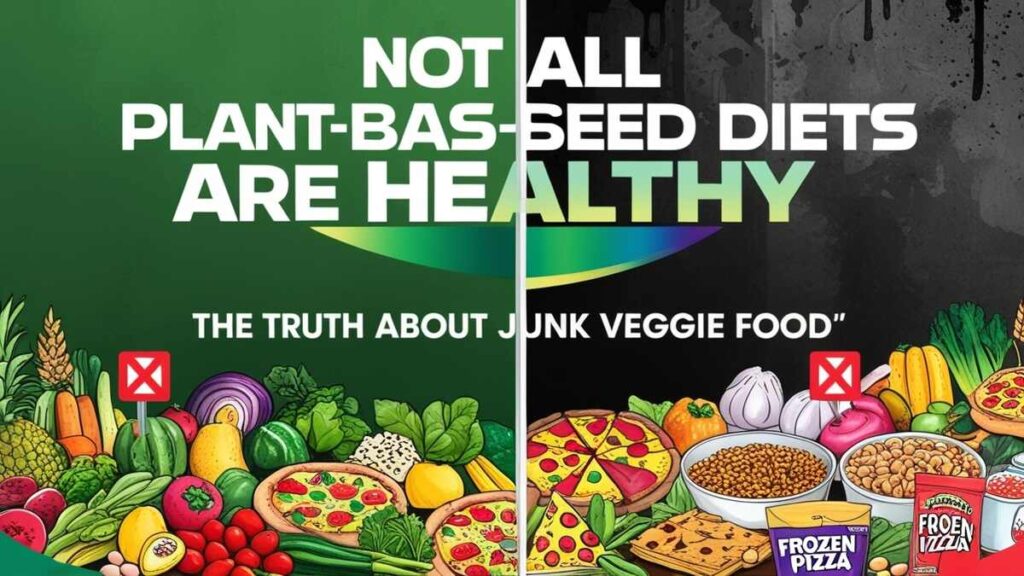Introduction: The Rise of Plant-Based Eating
Plant-based diets have surged in popularity in recent years, promising benefits: better health, reduced environmental impact, and ethical eating. However, there are differences among plant-based diets. Here’s a hard truth — not all plant-based diets are healthy. Beneath the alluring “green” labels and trendy marketing lies a less glamorous reality: the emergence of junk veggie food, which can harm your health just as much as traditional junk food.
- Introduction: The Rise of Plant-Based Eating
- What Exactly is Junk Veggie Food?
- The Hidden Dangers of Junk Veggie Food
- Why Whole Foods Are Always Superior
- The Role of Marketing in the Rise of Junk Veggie Food
- A Personal Story: Learning the Hard Way
- How to Spot and Avoid Junk Veggie Food
- The Environmental Impact of Junk Veggie Food
- Tips for Transitioning to a Healthier Plant-Based Diet
- Conclusion: The Truth About Junk Veggie Food
Let’s explore the truth about junk veggie food—what it is, why it’s problematic, and how you can make smarter choices for your health and the planet.
What Exactly is Junk Veggie Food?
“junk veggie food” refers to processed, plant-based products marketed as healthy alternatives to meat and dairy but often lack nutritional value. Popular examples include vegan nuggets, faux cheese, and plant-based frozen meals. While they may fit the “plant-based” label, these items are far from wholesome.
Characteristics of Junk Veggie Food
- High in Additives and Preservatives: These products rely heavily on artificial flavorings, stabilizers, and thickeners to replicate the taste and texture of traditional foods.
- Loaded with Sodium and Sugar: Processed plant-based foods often contain excessive sodium and sugar to enhance flavor and extend shelf life.
- Low Nutritional Value: Despite their eco-friendly claims, many are calorie-dense but nutrient-poor, offering little essential vitamins, minerals, or fiber.
While the convenience of junk veggie food can be tempting, its hidden ingredients undermine the health benefits of a plant-based diet.
The Hidden Dangers of Junk Veggie Food
Transitioning to a plant-based diet is often associated with improved health. However, relying on processed alternatives can lead to negative consequences that counteract those benefits.
High-Calorie, Low-Nutrient Profiles
Many plant-based alternatives, such as meat-free burgers, are calorie-dense but lack nutritional depth. While they may contain protein, they’re often stripped of essential nutrients like fiber and antioxidants, naturally abundant in whole plant foods.
Sodium Overload
Salt is often the key ingredient used to mimic the savory flavor of meat. Some processed plant-based foods contain over 1,000 mg of sodium per serving, surpassing the recommended daily intake. Over time, excessive sodium consumption can lead to hypertension, cardiovascular disease, and kidney problems.
Chemical Additives
Processed alternatives often feature carrageenan, monosodium glutamate (MSG), and artificial flavoring to replicate meat and dairy. While these chemicals are deemed safe in small quantities, regular consumption may cause digestive distress and exacerbate inflammation.
Why Whole Foods Are Always Superior
To achieve better health through plant-based eating, focus on whole, unprocessed foods. Unlike processed options, whole foods are naturally nutrient-dense and free from harmful additives.
Benefits of Whole Plant Foods
- Powerhouses of Nutrition: Rich in vital minerals, vitamins, and fiber.
- Low-Calorie Density: They help with weight management while keeping you full longer.
- No Hidden Ingredients: Whole foods like fruits, vegetables, legumes, and grains are free from additives or hidden sugars.
A simple dish of quinoa paired with roasted vegetables and tahini dressing provides more sustained energy and nutrition than any processed plant-based burger could offer.
The Role of Marketing in the Rise of Junk Veggie Food
Marketing plays a significant role in shaping consumer perceptions of plant-based products. Many processed plant-based foods are promoted as healthy despite being heavily engineered and lacking nutritional value.
Greenwashing in the Food Industry
Greenwashing refers to marketing tactics that make products appear more eco-friendly or healthier than they are. For instance, while vegan nuggets may tout their “dairy-free” or “cruelty-free” claims, they often contain a laundry list of synthetic ingredients.
Celebrity Endorsements
High-profile endorsements have glamorized plant-based diets, fueling the demand for convenience-oriented products. Unfortunately, these campaigns rarely highlight the potential downsides of junk veggie food.
A Personal Story: Learning the Hard Way
Meet Sarah, a college student who embraced a plant-based diet to improve her energy levels and reduce her environmental impact. Initially, she relied on plant-based frozen meals and vegan snacks due to their convenience. However, she soon found herself feeling fatigued and struggling with frequent cravings.
After consulting a nutritionist, Sarah learned that her diet was filled with junk veggie food — high in calories but low in essential nutrients. By switching to whole foods like lentils, sweet potatoes, and leafy greens, Sarah saw remarkable improvements in her energy and focus.
How to Spot and Avoid Junk Veggie Food
Navigating the plant-based food aisle can feel overwhelming. However, you can separate healthy options from highly processed ones with some knowledge.
Read Ingredient Labels
Check for short ingredient lists with recognizable items. Avoid products containing:
- Artificial additives like flavors, stabilizers, and colorings.
- Added sugars hidden under names like dextrose or high-fructose corn syrup.
- Excessive sodium levels exceed 20% of your daily recommended intake.
Choose Whole Food Ingredients
Prioritize foods that are minimally processed. For instance:
- Lentils and quinoa over vegan nuggets.
- Homemade hummus instead of packaged vegan dips.
Cook More at Home
You have total control over the ingredients when you cook at home. Experiment with recipes highlighting whole, plant-based foods, such as Buddha bowls, stir-fries, and soups.
The Environmental Impact of Junk Veggie Food
While plant-based diets are often championed for sustainability, processed foods don’t always live up to that promise.
The Carbon Footprint of Processing
Producing processed plant-based foods requires significant energy and resources, often resulting in a carbon footprint comparable to or higher than that of some animal products. Whole foods, on the other hand, have a much lower environmental impact.
Packaging Waste
Processed foods typically come in plastic-heavy packaging, contributing to environmental degradation. Opting for bulk grains, fresh produce, and unpackaged foods can significantly reduce waste.
Tips for Transitioning to a Healthier Plant-Based Diet
Changing to a plant-based diet doesn’t have to be difficult. You can enjoy all the benefits with the right approach while avoiding junk veggie food.
Start Gradually
Replacing one processed meal a week with a homemade, whole-food alternative. For example, swap frozen vegan pizza for a homemade vegetable stir-fry.
Plan Your Meals
Meal prepping ensures you have nutritious options readily available, reducing the temptation to reach for processed foods.
Stay Educated
Keep learning about plant-based nutrition. Understanding the pitfalls of junk veggie food will help you make more informed decisions.
Conclusion: The Truth About Junk Veggie Food
The appeal of a plant-based diet is clear—it promises better health, ethical eating, and environmental sustainability. However, the truth about junk veggie food is a crucial wake-up call: not all plant-based options are created equal. Many processed alternatives, marketed as healthy, are loaded with additives, sodium, and unhealthy fats, undermining the core benefits of plant-based eating.
To truly thrive in this lifestyle, it’s essential to prioritize whole, nutrient-dense foods like fresh fruits, vegetables, legumes, and grains. These options provide the fiber, vitamins, and minerals your body needs while minimizing your environmental footprint. By avoiding heavily processed foods, you can enjoy lasting health benefits and contribute meaningfully to the planet’s well-being.


